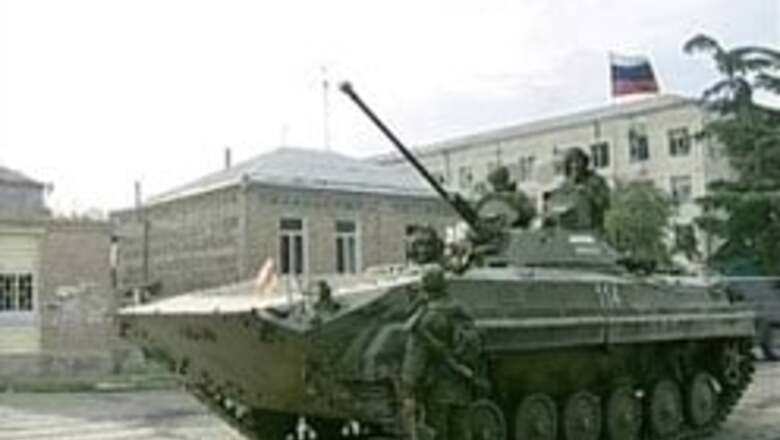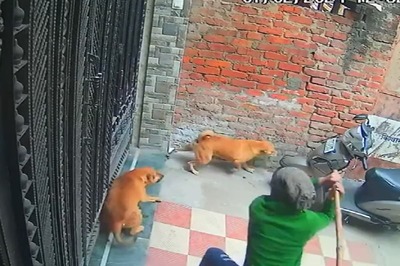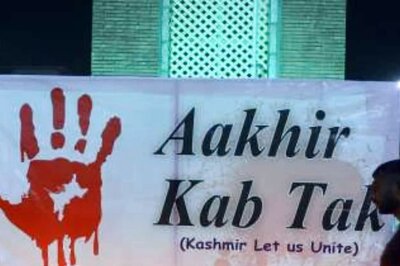
views
Moscow: After nearly four days of fighting between Georgian and Russian troops in the breakaway region of South Ossetia Russian troops have taken control of the regional capital Tskhinvali, as the Georgian government announced a unilateral ceasefire which still looked uncertain.
Even as the withdrawal of Georgian forces from Tskhinvali was confirmed by the Russian military, there were reports of continued fighting including the sinking of several Georgian warships and an attack by Russian jets on Tbilisi's airport.
The Russian defence ministry however denied the reports, saying they were "provocations with the aim of deceiving the international community."
A reporter at the scene however reported smoke was billowing from an airfield near the capital's airport after the attack described as one of the most daring across Georgia since fighting broke out.
Officials said that since Friday Russian planes had bombed several parts of Georgia - areas near a military base in Vaziani, a military airport in Marneuli, the port of Poti and a railway junction and an airport in Senaki.
Russia confirmed receiving on Sunday a Georgian diplomatic note announcing an immediate unilateral ceasefire in the conflict over South Ossetia, but criticized the continuation of combat operations in the conflict region, according to the Interfax news agency.
The note reportedly told the Russian foreign ministry that Georgian forces were to cease fire as of Sunday by order of President Mikheil Saakashvili, with all "military units" to be withdrawn from "the conflict area" and "a corridor for humanitarian purposes" was to be created.
At the height of the conflict, ground fighting between Russian and Georgian forces had been the fiercest at Tskhinvali, in infantry battles throughout the night as Russian forces engaged Georgian troops holding heights overlooking the town.
Georgia, claiming on Sunday that 15 of its cities have been bombarded by Russia, charged that Moscow was invading Georgia itself.
"We are dealing with a total Russian aggression and invasion - on land, air and at sea," said Aleksander Lomaia, secretary of the Georgian National Security Council, described a widening conflict in a telephone conference call with journalists.
Georgia gave its military losses as of Saturday at some 50 men dead and 450 wounded. Russia had admitted to 12 men dead and 150 injured.
Estimates of civilian dead in the fighting have exceeded 1,600 people. The Tskhinvali town hospital alone as of Sunday morning was treating 200 injured and had more than 50 dead in its morgue, according to the report.
It is estimated that more than 30,000 people have fled the crisis zone to neighbouring North Ossetia.
Russian Prime Minister Vladimir Putin during a Saturday visit to Russia's 58th Army headquarters in Vladkavkaz said the Kremlin's intention was to push out or destroy all Georgian forces in South Ossetia. He justified the Russian offensive as part of a peacekeeping operation.
PAGE_BREAK
Georgian President Mikheil Saakashvili the same day accused Russia of conducting all-out war against Georgia, pointing to airstrikes and a naval blockade outside the South Ossetia region.
Leaders around Europe and the world were making diplomatic efforts and statements to defuse the ongoing conflict - including France and Germany sending envoys to the region - but so far the international community has failed to produce any practical results.
The UN's Security Council on Sunday met again in emergency session on South Ossetia and, for the fourth day in a row, was unable to decide even on a common position statement, because of differences between Russia and the US.
In Brussels, NATO and the European Union also called emergency meetings for later this week to discuss a joint response to the crisis. The EU also offered 1 million euros in emergency aid to victims of the fighting.
Another potential flashpoint for a widening of the war was in the Black Sea near the Georgian port Batumi, where Turkish warships had taken up station. There had been no reports by Sunday of contact between the Turks, and elements of the Russian navy operating further south.




















Comments
0 comment